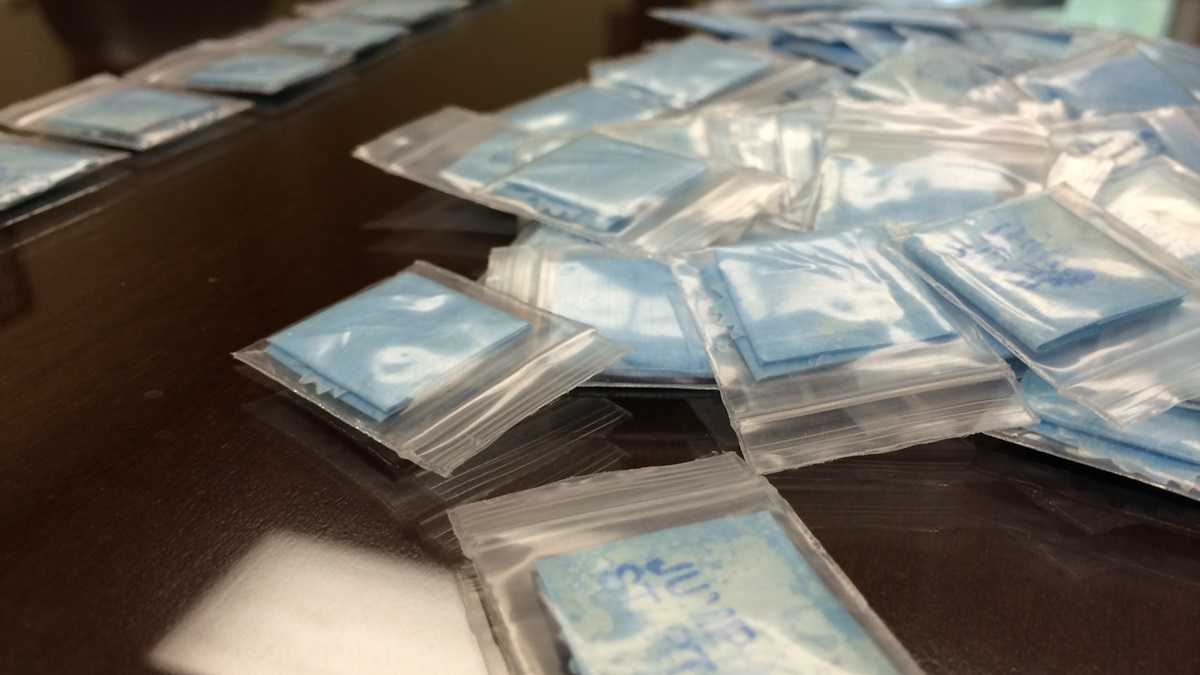Twenty-one overdoses, two fatalities, in southern Delaware

(File/WHYY)
Health officials report overdose spike in western Sussex County over the weekend.
Following a spike in heroin overdoses in Sussex County over the weekend, health professionals and law enforcement are focused on enforcement, prevention and treatment efforts in the area.
There were 21 overdoses, including two fatalities, between Thursday and Sunday afternoon, according to the Department of Health and Social Services and Delaware State Police. Fifteen of the overdoses took place in the western part of the county, particularly in the Seaford and Laurel areas.
EMS used the overdose-reversing medication naloxone on 20 individuals before transporting them to the hospital.
Now the agencies are alerting users, families and healthcare professionals to seek and provide treatment.
“This spike in overdoses is alarming,” said Dr. Kara Odom Walker, a family physician and secretary of the Department of Health and Social Services.
“Even one use of heroin or another opioid can end a life. For people in active use and their families, please convince your loved ones to seek treatment for their addiction or keep naloxone in your home. Addiction is a disease and treatment does work. Our staff at the DHSS Crisis Helpline will listen and they will connect you to treatment options.”
There has been a surge in overdoses over the past couple years during what many call a heroin epidemic. In 2016, 308 individuals died from overdoses in Delaware—almost triple the number who died in traffic accidents—compared to 228 in 2015, and 222 in 2014.
While overdose rates are on the rise, the spike in western Sussex County over the weekend is significant, Odom Walker said. In comparison, there were eight individuals who received naloxone in Kent and New Castle counties during the same time period.
The health department doesn’t know why there’s a spike in the area, but suspect fentanyl—which is 50 times more potent than pure heroin—was laced in the drugs the overdose victims and survivors consumed.
Of the 308 overdose deaths last year, 120 involved fentanyl—compared to about a dozen two years prior.
There have been fentanyl cases throughout the state, but Odom Walker said the overdoses over the weekend are likely a cluster of cases, involving the consumption of drugs from the same batch. Drug dealing resulting in death is a felony and can result in two to 25 years in prison. However, no one in Delaware has been charged yet.
“I’m not sure it tells us anything new about the epidemic itself. What it does tell us is it’s likely there was a batch of drugs that made it into western Sussex County that were more potent than perhaps these individuals are used to,” Odom Walker said.
Western Sussex County is considered a “hot spot” for addiction problems, Odom Walker said. She said the health department is working with the community to identify specific needs in the area of addiction. Odom Walker said there’s a lack of access to treatment in the area, so the department is partnering with the county to provide prevention opportunities, and ensure individuals have access to care.
Treatment providers were notified of the overdose spike so they could be prepared to take on more clients.
“We want to encourage all individuals, family members, friends, loved ones, to know treatment is available—it works, and recovery is possible for many individuals,” Odom Walker said.
In response to the overdose cases, Connections Withdrawal Management Center in Harrington is offering services to individuals who need to access them immediately, without a wait.
There are 12 23-hour assessment beds and 16 inpatient beds. Individuals can receive immediate assessments by calling the withdrawal management center at 302-786-7800, or by stopping by the facility, located at 1 East St., Harrington, DE 19952.
This Saturday, the health department is participating in the twice-yearly Drug Take Back Day at 31 locations throughout the state between 10 a.m. and 2 p.m. Individuals can find a location close to home by clicking here.
“It’s a good reminder for people to remember a lot of people started their addiction by getting drugs out of medicine cabinets and it’s really important to clean out your medicine cabinet of these dangerous drugs,” Odom Walker said.
For users and families who want to be connected to treatment immediately, call the Department of Health and Social Services’ 24/7 Crisis Helpline at 1-800-345-6785 in Sussex and Kent counties, or 1-800-652-2929 in New Castle County.
A person witnessing an overdose should call 911. Under Delaware law, those who report an overdose cannot be arrested for low-level drug crimes.
Prevention, treatment and recovery information and resources in Delaware and nearby states also are available on DHSS’ www.HelpIsHereDE.com website.
The Sussex County Drug Unit is actively investigating and seeking information on any of this weekend’s drug overdoses. The public is encouraged to call Sergeant M. Dawson of the Sussex County Drug Unit at 302-752-3815 with any information.
WHYY is your source for fact-based, in-depth journalism and information. As a nonprofit organization, we rely on financial support from readers like you. Please give today.





